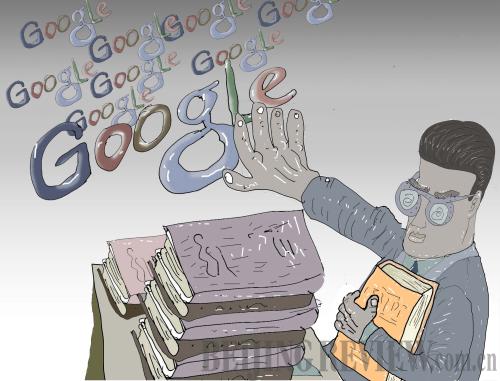|
 |
|
(LI SHIGONG) |
Xinhua News Agency quoted Hartmann as saying that the company had obtained authorization from U.S. publishers and libraries and did not use the books directly for profit.
"As far as I know, not all Chinese writers have transferred their online copyright to the publishers in their contracts. Thus Google cannot get authorization for digital use of books simply from their publishers," Zhang said.
Zhang said no Chinese publisher had required CWWCS to drop its investigation since the organization launched its probe against Google.
He said it is common sense that libraries, no matter how big they are, have no rights whatsoever to authorize the digital use of the copyrighted documents that they store. He also objected to Google's argument that its online library does not violate copyrights as it only put abstracts of Chinese books online instead of full texts.
"The scanning of books itself violates the reproduction right of a protected work, an important right to copyright owners," said Zhang.
Zhang Zhifeng, a Beijing-based attorney who specializes in intellectual property rights (IPR), told Beijing Review that Google had infringed upon Chinese IPR laws when it scanned Chinese authors' copyrighted works without their authorization.
"It has surpassed the scale of 'proper use' and it should be considered a commercial act, whether Google directly procured profits from its Book Search or not," said Zhang.
Hartmann told The Beijing News that it is too difficult for Google to inform copyright holders before scanning their works that are stored in libraries, since one library may hold over 1 million volumes and rights holders of over 80 percent of works cannot be found.
"This does not justify failing to inform the authors," Zhang said. "This act is nothing less than a burglar using the excuse that the house owner is not at home to justify his coming in and taking away valuable possessions."
However, Zhang said his organization appreciates Google's commitment to solving the accusation of infringement through negotiations. He said the talks are still at a preliminary stage and Chinese authors are still looking to "extract an explanation" from the company. He expects that it will take a while for both sides to come up with a standard compensation package.
Mian Mian, a best-selling novelist, filed a lawsuit against Google on November 6, demanding that the Internet company delete her work from its Book Search results, publicly apologize to her and compensate her 60,000 yuan ($8,800) for economic losses and mental anguish.
The author found that one of her romance novels was included in Google's Book Search results. She said the display of scanned snippets of her work damaged the integrity of the novel.
However, Google's ambitious Library Project building, which is also the largest online book repository, has many Chinese fans. In an editorial on China Youth Daily titled "Chinese Writers: Stop Your Anger Against Google's Infringement," the newspaper called Google's plan "an exciting project" that would overcome the time and place limitations for people to share humanity's cultural heritage.
"We cannot imagine how the communication between civilizations could be broadened when people across the world could use a computer to view records on an ancient Chinese place stored in the Library of Congress of the United States," said the newspaper. "It is no exaggeration to call it a project benefiting mankind."
Google Books' Bumpy Road
In 2004, Google announced the beginning of the Google Print Library Project by starting to scan books from partner libraries, including Harvard University, the University of Michigan and the New York Public Library.
In 2005, the Authors Guild of America (AG) and the Association of American Publishers (AAP) filed separate lawsuits against Google, alleging that its scanning and digitizing of library books constitute a copyright infringement. Google changed Google Print to its current Google Books.
In March 2007, Google launched its Book Search interface in Chinese, the eighth language in which the service was made available.
In October 2008, Google reached an out-of-court settlement with AG and a group of publishers, enabling authors and publishers to receive compensation totaling $125 million for online access to their works. Under the terms of the settlement, Google will be responsible for selling access to copyrighted works in its repository. Most of the revenues from such access would go to authors and publishers.
In June 2009, the International Federation of Reproduction Rights Organizations, of which AG and AAP are members, requested the Chinese Written Works Copyright Society (CWWCS) notify Chinese authors and publishers concerning their rights under the settlement. CWWCS posted a circular to Chinese copyright owners on its website.
In September, CWWCS released a survey claiming that Google Book Search had scanned at least 17,922 copyrighted Chinese books written by 570 authors. CWWCS also urged Chinese authors to use Google Book Search to find out whether Google had collected their works without informing them.
On October 9, Google announced that its Library Project contained over 10 million books.
On October 16, Eric Hartmann, the Asia-Pacific head of Google Books, wrote on googlechinablog.com that 50 Chinese publishers had joined Google's library project partner program, which authorized Google to provide a preview of up to 20 percent of the content of 600,000 books.
On November 2, during Eric Hartmann's meeting with CWWCS in Beijing, he admitted that Google scanned a large number of books under Chinese copyright, but refuted any infringement.
On November 13, a revised Google Books settlement was submitted, which scaled back the countries the agreement covers to the United States, Britain, Canada and Australia.
(Source: The Beijing News) | 